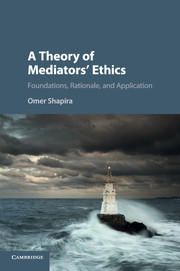Book contents
- Frontmatter
- Dedication
- Contents
- List of figures
- List of tables
- Preface
- Abbreviations of codes of conduct
- PART I A theory of professional ethics
- PART II A theory of mediators’ ethics
- 3 Mediation, mediators’ role, and mediators’ ethics
- 4 Party self-determination
- 5 Mediator competence
- 6 Conflicts of interest
- 7 Mediator impartiality
- 8 Professional integrity
- 9 Diligence, respect and dignity, and honesty
- 10 Confidentiality
- 11 Fairness
- 12 Maintaining the profession's standing and advancement of the profession
- 13 Advertising, solicitation, and mediator fees
- 14 Obligations to employers and principals
- PART III Dealing with ethical problems
- Appendix I A proposed model code of conduct for mediators
- Appendix II Model standards of conduct for mediators (2005)
- Bibliography
- Index
11 - Fairness
from PART II - A theory of mediators’ ethics
Published online by Cambridge University Press: 05 March 2016
- Frontmatter
- Dedication
- Contents
- List of figures
- List of tables
- Preface
- Abbreviations of codes of conduct
- PART I A theory of professional ethics
- PART II A theory of mediators’ ethics
- 3 Mediation, mediators’ role, and mediators’ ethics
- 4 Party self-determination
- 5 Mediator competence
- 6 Conflicts of interest
- 7 Mediator impartiality
- 8 Professional integrity
- 9 Diligence, respect and dignity, and honesty
- 10 Confidentiality
- 11 Fairness
- 12 Maintaining the profession's standing and advancement of the profession
- 13 Advertising, solicitation, and mediator fees
- 14 Obligations to employers and principals
- PART III Dealing with ethical problems
- Appendix I A proposed model code of conduct for mediators
- Appendix II Model standards of conduct for mediators (2005)
- Bibliography
- Index
Summary
Introduction
Fairness is considered an important value of mediation. Jacqueline M. Nolan-Haley, for example, noted that “[t]here is little dispute that fairness is the fundamental goal of any dispute resolution process including mediation,” and Ellen Waldman described fairness in her casebook on mediation ethics as an underlying value of mediation practice that influences mediators’ ethical decision making. However, the terms “fairness” and “unfairness” are used in numerous contexts in codes of conduct for mediators and in mediation literature without being adequately defined. As a result, the meaning of statements such as “the mediator must act fairly,” “the mediator should conduct a fair process,” and “mediation should produce fair outcomes” remains vague. Moreover, without a clear definition of fairness these statements cannot be fully evaluated, agreed with, or rejected. This chapter briefly explains the meaning of fairness in the context of mediation for the purpose of ascertaining its implications for the ethical conduct of mediators. After distinguishing between a norm of fairness and a perception of fairness, it argues that statements about the fairness of mediation often simply mean that the mediator, the mediation process, or the mediation outcome comply with the standards of mediation practice. It then goes on to suggest several ways in which an understanding of fairness from a professional ethics perspective can contribute to the ethics of mediators: it offers guidance on the proper approach to the interpretation of the norms that regulate the conduct of mediators, that is, the adoption of a substantive interpretation that is grounded in reality and committed to the spirit and purpose of the norms of mediation; it provides a normative basis for an obligation of mediators (toward the profession) to follow all the standards of mediation; and it explains the obligation of mediators (toward the public) to follow the rules of law and critical morality in the exercise of their professional role.
Understanding the meaning of fairness in mediation
For our purposes, fairness should be looked at from two perspectives: fairness as a normative term and fairness as a perception. Normative fairness represents a norm of behavior that should be followed. Its formal sense is playing by the rules; thus, adherence to the rules would be considered fair while breaking the rules would be considered unfair. For example, one of the rules of mediation requires mediators to act impartially.
Information
- Type
- Chapter
- Information
- A Theory of Mediators' EthicsFoundations, Rationale, and Application, pp. 302 - 310Publisher: Cambridge University PressPrint publication year: 2016
